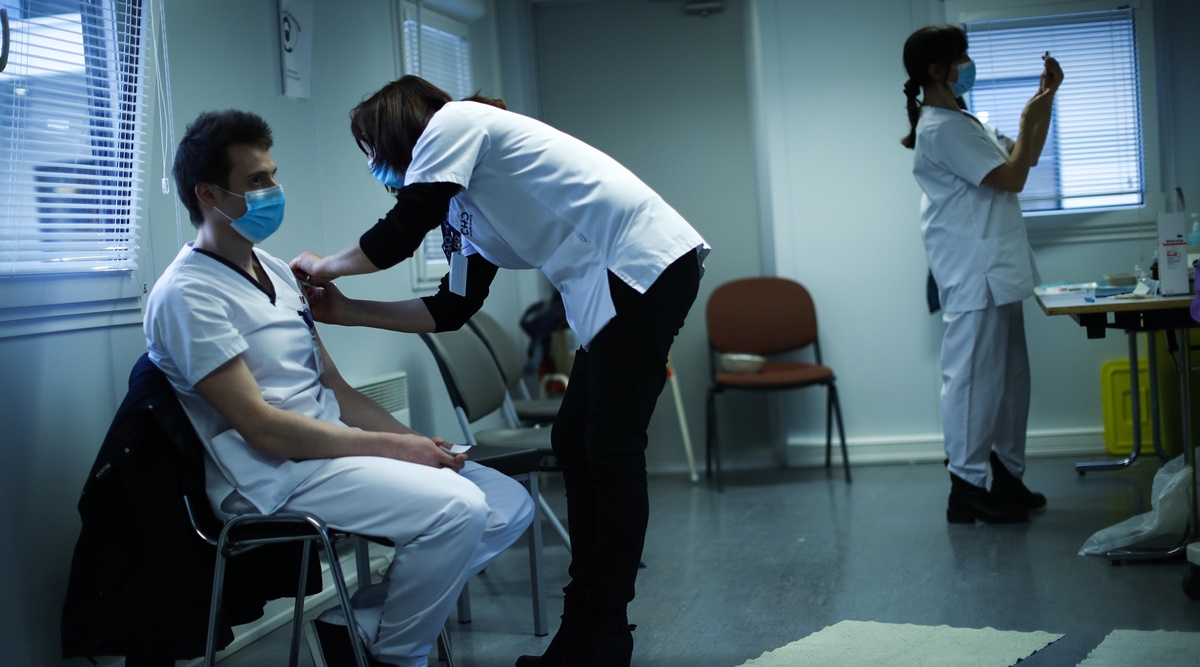 A person being vaccinated. (AP File Photo/Francisco Seco)
A person being vaccinated. (AP File Photo/Francisco Seco) A three-month interval between doses of the Oxford Covid-19 vaccine results in higher vaccine efficacy than a 6-week interval, with the first dose offering 76% protection in the three months between doses. These results, from post-hoc exploratory analyses, from a phase 3 randomised controlled trial published in The Lancet, suggest the interval between doses can be safely extended to three months given the protection a single dose offers, which may allow countries to vaccinate a larger proportion of the population more rapidly.
The authors note this regimen may be beneficial while vaccine supplies are initially limited. Study lead author Professor Andrew Pollard, University of Oxford, UK, said in an official statement issued by The Lancet. “Vaccine supply is likely to be limited, at least in the short term, and so policy-makers must decide how best to deliver doses to achieve the greatest public health benefit. Where there is a limited supply, policies of initially vaccinating more people with a single dose may provide greater immediate population protection than vaccinating half the number of people with 2 doses. In the long term, a second dose should ensure long-lived immunity, and so we encourage everyone who has had their first vaccine to ensure they receive both doses.”
Following the regulatory approval of a vaccine, it is important to understand the best dose interval to ensure optimal roll-out of the vaccine. Factors associated with this include the effect of different intervals on protection after the second dose, and the risk of infection between doses either due to lower efficacy of a single dose or rapid waning of efficacy while waiting for the second dose.
To understand these factors, the authors combined data from randomised controlled trials in the UK, Brazil, and South Africa, including 8,948, 6,753, and 1,477 people, respectively (totalling 17,178 people). Participants were aged 18 years and over, and either received two standard doses of the Oxford Covid-19 vaccine (8,597 participants) or a control vaccine/saline placebo (8,581). In the UK trial, a subset of participants (1,396 people) received a lower dose of the vaccine as their first dose.
The primary outcome of the trial was the number of symptomatic Covid-19 cases (confirmed by positive Covid-19 test, and having fever, cough, shortness of breath, loss of smell or loss of taste) in the control and Covid-19 vaccine groups occurring more than 14 days after the second dose.
The exploratory analyses in the new study (of the efficacy of an extended interval between vaccine doses and of a single dose) were requested by regulators and policy makers, and the authors also conducted an analysis to establish the impact of one or two doses of the vaccine on reducing all Covid-19 cases (including symptomatic cases, cases with less common Covid-19 symptoms, asymptomatic cases, and those with unknown symptoms) as an indicator of how the vaccine might help reduce transmission in the community.
The single-dose analysis included participants who chose not to receive a second dose (the trial was originally set up as a single-dose vaccine trial, and so some chose not to participate further), and people who had Covid-19 before they received their second dose. To establish the efficacy of a single dose, the authors analysed participants who had had their first standard dose and had tested positive for Covid-19 more than 21 days afterwards.
Looking at the interval between two standard doses and its impact on efficacy, participants who were given their doses 12 or more weeks apart had greater protection (81%, based on 8/1,293 cases in the Covid-19 vaccine group vs 45/1,356 cases in the control group), than people given their two doses less than six weeks apart (55%, based on 35/3,890 cases in the Covid-19 vaccine group vs 76/3,856 cases in the control group). Efficacy results were supported by immune response results in 18-55 year olds, which found that binding antibody responses were more than two-fold higher in the group having their two vaccines with a longer delay.
Following a single standard vaccine dose, vaccine efficacy from 22 days to three months after vaccination was 76% (based on 17/9,257 cases in the Covid-19 vaccine group vs 71/9,237 cases in the control group), and modelling indicated that this protection did not reduce over the 3 months. In addition, antibody levels against the SARS-CoV-2 spike protein remained at similar levels for 3 months.
The authors note it is not yet clear how long protection with a single dose of the vaccine might last, as the trial results are limited to the three months maximum. For this reason, a second dose of vaccine is still recommended.
Professor Pollard said: “It is important to understand whether vaccines can reduce Covid-19 transmission. While specific transmission studies were not included in our analysis, UK trial participants were tested for Covid-19 each week regardless of symptoms, and we combined this with other positive Covid-19 cases in the trial to help determine the overall impact of the vaccine on risk of infection. If the vaccine had no impact on transmission, we would expect the number of positive tests in our trial would be the same in vaccine and control groups. This is because the vaccine would convert severe cases to mild cases, and mild cases to asymptomatic cases. However, we saw a reduction in the overall number of positive cases, which indicates the vaccines may reduce infections. Real-world assessments of how the vaccine is working in the population will be needed to confirm this preliminary result.